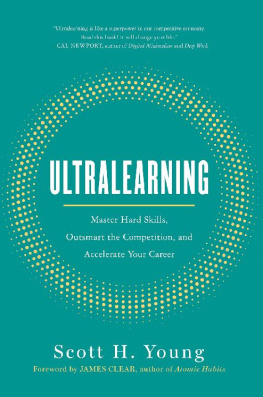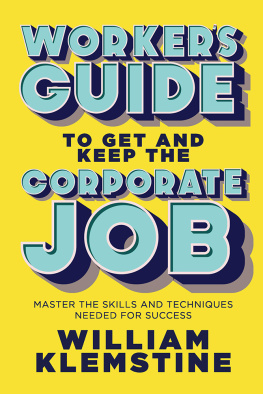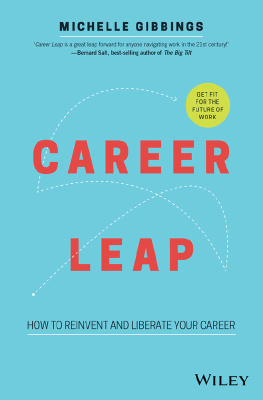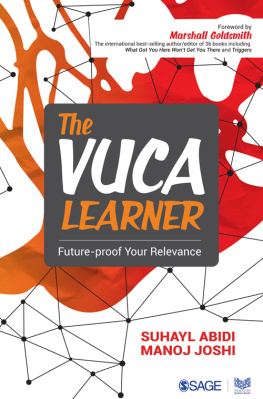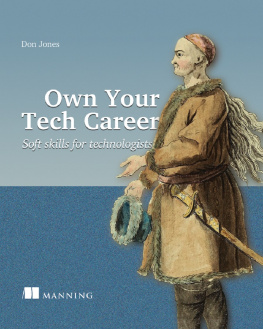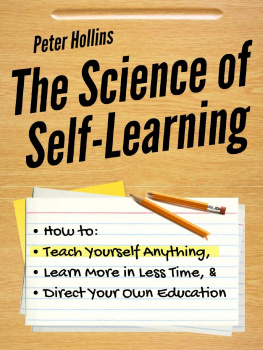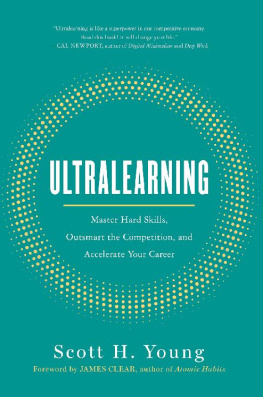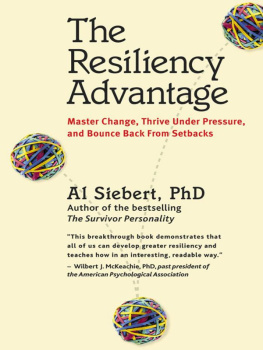M y relationship with Scott Young began in mid-2013. On July 10, I sent him an email asking if he wanted to set up a call for the following month. We had met at a conference a few days earlier, and I was hoping he would be willing to continue the conversation.
Possibly, he replied. Ill be in Spain then, and the language-learning focus of my upcoming project may take precedence.
It wasnt the response I was hoping for, but it seemed reasonable. Managing calls while traveling internationally can be tricky, and I understood if he wanted to wait until he returned. However, I quickly found out that he would not be returning anytime soon, and it was not the time change nor a spotty internet connection that would postpone our conversation.
No, it would be hard to catch up with Scott because he was planning to speak no English for an entire year .
Thus began my introduction to Scott Young and his commitment to ultralearning. Over the next twelve months, I would trade sporadic emails with Scott as he traveled to Spain, Brazil, China, and Korea, and proceeded to become conversational in each of the respective languages along the way. He was true to his word: it was not until the following summer in 2014 that we carved out time to catch up regularly and began chatting with each other every few months.
I was always excited for my calls with Scottprimarily for selfish reasons. One of my core interests as a writer is the science of how to build good habits and break bad ones. Someone like Scott, who had so clearly mastered his own habits, was exactly the type of person who could teach me a thing or two. And thats precisely what happened. I can scarcely remember finishing a call with Scott and not learning something during the previous hour.
Thats not to say his insight took me by surprise. Scott had already been on my radar by the time we met at that conference in 2013. He had catapulted to internet fame one year prior by learning the entire MIT undergraduate computer science curriculum and passing all of the final tests in less than a yearfour years worth of classes in under twelve months. I had seen the TEDx Talk summarizing his experience, and I read a few of his articles on learning and self-improvement before tracking him down at the conference.
The idea of taking on an ambitious projectlike studying MITs undergraduate curriculum in one year or learning a new language every three monthsis inspirational to many people. I certainly found these bold projects fascinating. But there was something else about Scotts projects that resonated with me on a deeper level: he had a bias toward action.
This is something I have always appreciated about Scotts approach and something I believe you will appreciate as a reader of this book. He isnt focused on simply soaking up knowledge. He is committed to putting that knowledge to use. Approaching learning with an intensity and commitment to action is a hallmark of Scotts process. This approach speaks to me, in part, because I see similar patterns in my own life and career. Some of my most meaningful experiences have been the result of intense self-directed learning.
Although I didnt know the word ultralearning at the time, one of my first ultralearning projects was photography. In late 2009, I moved to Scotland for a few months. It was my first time living abroad, and given the beautiful scenery throughout the Scottish Highlands, I figured I should buy a decent camera. What I hadnt expected, however, was that I would fall in love with the process of taking photos. What followed was one of the most creative periods of my life.
I learned photography through a variety of methods. I studied the portfolios of famous photographers. I scouted locations and searched for compelling perspectives. But, most of all, I learned through one simple method: I took over 100,000 photos that first year. I never enrolled in a photography class. I didnt read books on how to become a better photographer. I just committed to relentless experimentation. This learning by doing approach embodies one of my favorite chapters in this book and Scotts third principle of ultralearning: directness.
Directness is the practice of learning by directly doing the thing you want to learn. Basically, its improvement through active practice rather than through passive learning. The phrases learning something new and practicing something new may seem similar, but these two methods can produce profoundly different results. Passive learning creates knowledge. Active practice creates skill.
This is a point that Scott more fully clarifies and refines in : directness leads to skill development. You can research the best instructions on the bench press technique, but the only way to build strength is to practice lifting weights. You can read all of the bestselling sales books, but the only way to actually get customers is to practice making sales calls. Learning can be very useful, of course, but the danger is that the act of soaking up new facts can be disconnected from the process of refining a new skill. You can know every fact about an industry and still lack real-world expertise because you havent practiced the craft.
Scott understands the difficulty of actually learning new skills. I respect him not only for the quality of his writing but also for the simple fact that he is a practitioner of his own ideas. I cant say enough about how important this is: he has skin in the game. Many ideas sound brilliant on paper but fail in the real world. As the saying goes, In theory, there is no difference between theory and practice. But in practice, there is.
As for my photography quest, it didnt take long for my commitment to direct practice to pay off. A few months after I bought my camera, I traveled to Norway and ventured above the Arctic Circle to capture an image of the aurora borealis. Not long afterward, I was named a finalist for Travel Photographer of the Year thanks to that image of the Northern Lights. It was a surprising outcome, but also a testament to how much progress you can make during a short but intense period of learning.
I never pursued a career as a photographer. It was an ultralearning project I did for fun and personal satisfaction. But a few years later, right around the time I first met Scott, I began another period of intense learning with a more utilitarian outcome in mind: I wanted to be an entrepreneur, and I figured writing would be one path that could get me there.
Once again, I had selected a domain where I had little formal experience. I had no entrepreneurs in my family, and I had taken only a single college English class. But as I read through Ultralearning , I was startled to find that Scott explained, in nearly step-by-step fashion, the process I followed to go from unproven entrepreneur to bestselling author.
Principle #1: MetalearningI started by examining other popular bloggers and authors. Their methods helped me to create a map for what I needed to do to become a successful writer.
Principle #2: FocusI went full-time as a writer nearly from the start. Aside from a few freelance projects I took on to pay the bills, the vast majority of my time was spent reading and writing.
Principle #3: DirectnessI learned writing by writing . I set a schedule for myself to write a new article every Monday and Thursday. Over the first two years, I produced more than 150 essays.
Principle #4: DrillI systematically broke down each aspect of writing articlesthe headline, the introductory sentence, the transitions, the storytelling, and moreand put together spreadsheets filled with examples of each segment. Then I set about testing and refining my ability to perform each small aspect of the larger task.

